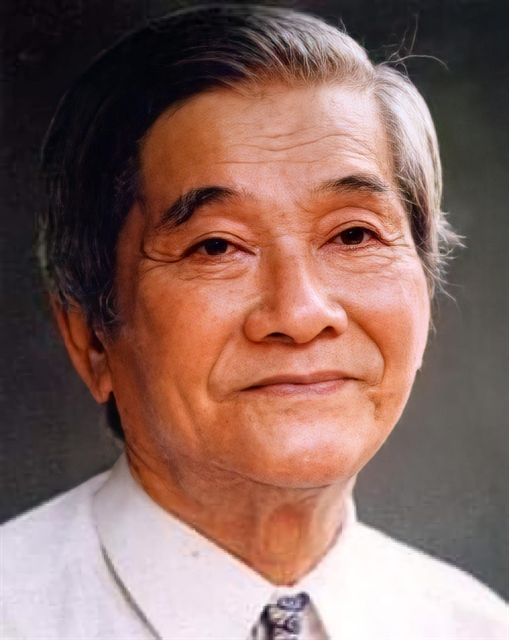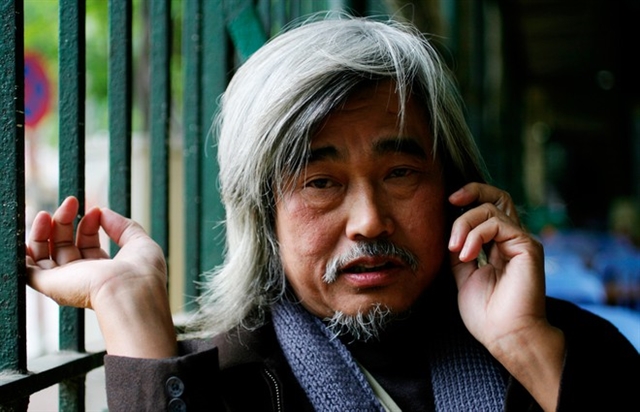
Nguyễn Xuân Sanh is the last representative of the New Poetry Movement. — Photo courtesy of Vietnam Writers' Association
HÀ NỘI — Celebrated poet, talented translator and the last representative of the New Poetry Movement, Nguyễn Xuân Sanh, passed away on Sunday in Hà Nội, aged 100.
Sanh was born on November 16, 1920 in Đà Lạt City in the central province of Lâm Đồng. His father was a Confucian scholar originally from the central province of Quảng Bình and then immigrated to the city.
He attended high school and university in Hà Nội, where he started to write his first poems at a young age. At the age of 16, he had his first poem entitled Lạc Loài (Outsider) published in many newspapers.
In 1939, Sanh, together with other like-minded artists, including Phạm Văn Hạnh, Nguyễn Lương Ngọc, Nguyễn Đỗ Cung and Nguyễn Xuân Khoát, established a group called Xuân Thu Nhã Tập. By June 1942, the group established a book featuring their poems, philosophical prose and artistic declarations. According to some researchers, Xuân Thu Nhã Tập significantly contributed to the innovation and creativity in a new stage of the New Poetry Movement in the literary scene of Việt Nam.
Before the August Revolution in 1945, Sanh joint the students’ patriotic movement. During the war against the French, he joined Inter-Region IV Art Troupe, being in charge of the Sáng Tạo (Creativity) Magazine.
In 1950, he went to Việt Bắc region to join the executive committee of the Vietnam Association of Arts and the arts subcommittee of the Central Committee of the Communist Party of Việt Nam.
Since the establishment of the Association of Vietnamese Writers in 1957, he was appointed as a member of its executive committee in the first, second and third sessions.
He worked as the principal of the Youth Writers’ Training School and the chairman of the Council of Translated Literature from 1966 to 1975.
In addition to the prose Anh Hùng Trần Đại Nghĩa (Hero Trần Đại Nghĩa) receiving the excellent award of the Vietnam Writers Association in 1951, Sanh is also the author of many famous poems like Chiếc Bong Bóng Hồng (The Pink Bubble) (1957), Tiếng Hát Quê Ta (The Singing Voice of Our Hometown) (1958) and Nghe Bước Xuân Về (Listening to Spring Coming) (1961).
Particularly, his two poems, Nhớ Dừa (Missing Coconut) and Cô Giáo Lớp Em (My Teacher), were integrated into the school curriculum, associated with generations of Vietnamese students over 60 years ago.
Sanh also translated many works of celebrated poets from many countries like Poland, Russia, Luxembourg and Germany.
The Vietnamese poet used to be the Deputy General Secretary of the Vietnam Writers Association in the first session and received the State Prize for literature and art in 2001.
The New Poetry Movement was a literary movement in 1930s colonial Việt Nam, abandoning the stylised forms of Chinese-influenced poetry in chữ Nôm for free verse in Latin-alphabet quốc ngữ (national language script).
Renowned Vietnamese translator dies at 68

Renowned Vietnamese translator Đoàn Tử Huyến. Photo thanhnien.vn
Renowned Vietnamese translator Đoàn Tử Huyến died Sunday in Sơn Tây Town in the outskirts of Hà Nội.
Huyến was born in 1952 in the central province of Hà Tĩnh. After graduating from the Faculty of Literature of the General University in the Soviet Union, he used to work as a lecturer in Russian literature at Hanoi University of Foreign Language Education (presently University of Languages and International Studies) and as a editor at Lao Động (Labour) Publishing House.
He was considered an excellent and senior translator who introduced many works of classical Russian literature into Việt Nam since the 1990s.
Some typical works of his translation career are The Master and Margarita by Russian author M. Bulgakov, which won the annual award of the Vietnam Writers Association for translation in 1990, Heart of a Dog also by M. Bulgakov and Drops from the Forest by Mikhail Prisvin. In addition, he also compiled and joined the translations of many other classic works like The Godfather by American writer Mario Puzo. — VNS
OVietnam